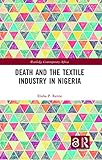Chapter Introduction
Material type: ArticleLanguage: English Publication details: Taylor & Francis 2021Description: 1 electronic resource (19 p.)ISBN:
ArticleLanguage: English Publication details: Taylor & Francis 2021Description: 1 electronic resource (19 p.)ISBN: - 9780367465520
- 9780367524906
- African history
- burying, cemeteries, chapter, children, city, closure, coalition, colonial, conclusion, consequences, construct, dead, death, deaths, deindustrialization, dilemmas, elisha, experiences, fall, families, hardship, health, hometowns, houses, industry, introduction, kaduna, ktl, ltd, new, nigeria, p, problems, regimes, renne, rise, textile, textiles, time, unpaid, widows', work, workers
Open Access star Unrestricted online access
While the opening of Kaduna Textiles Limited in 1957 represented the encouraging beginning of the industrialization of Kaduna, its closure in 2002 had significant consequences for workers and their families. Without payment of their termination entitlements, former KTL workers, wives, and widows met to establish the Coalition of Closed Unpaid Textiles Workers of Nigeria. Compiling a list of the names of deceased KTL workers, they hoped that “the work of the dead” would put pressure on government to pay their entitlements. For former KTL employees, their new ways of thinking about work, labor organization, time, money, and health were challenged by deindustrialization, while the lives of their widows and children were shattered by the loss of their husbands and fathers. Widows buried their husbands and subsequently worked to provide their children with education, housing, and food, while their children had various responses to their families’ declining economic situation. As such, deindustrialization in Kaduna, as elsewhere in the world, has contributed to unemployment, poverty, hunger, illness, and death. While remittances for dismissed KTL workers remain unpaid and the mill has not reopened, the Coalition’s listing of the names of the dead continues as a constant reminder of their society’s injustice.
Creative Commons https://creativecommons.org/licenses/by-nc-nd/4.0/ cc https://creativecommons.org/licenses/by-nc-nd/4.0/
English
There are no comments on this title.

